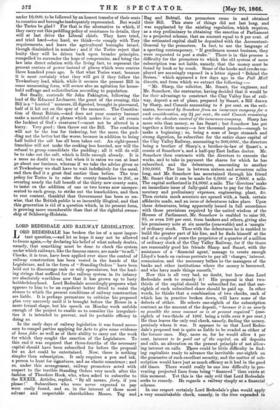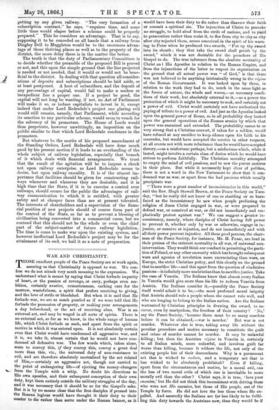LORD REDESDALE AND RAILWAY LEGISLATION.
LORD REDESDALE has broken the ice of a most impor- tant question,—and let us hope it may not be allowed to freeze again,—by declaring his belief of what nobody doubts, namely, that something must be done to check the system under which railways, like the famous razors, are made "to sell." Checks, it is true, have been applied ever since the control of railway construction has been vested in the hands of the Legislature, and in the form of "Standing Orders" have been held out to discourage rash or wily speculators, but the lead- ing strings that sufficed for the railway system in its infancy are absolutely worthless now that it has grown up to lusty tobbledehoyhood. Lord Redesdale accordingly proposes what appears to him to be an expedient better fitted to resist the abuses to which the present conditions of railway construction are liable. It is perhaps premature to criticize his proposed
• plan very narrowly until it is brought before the ouse in a more formal shape, but his speech on Monday week unfolds enough of the project to enable us to consider the irregulari- ties it is intended to prevent, and its probable efficacy in doing so.
. In the early days of railway legislation it was found neces- sary to compel parties applying for Acts to give some evidence of bona fides as well as of their ability to carry out the work for which they sought the sanction of the Legislature. To this end it was required that three-fourths of the necessary capital should have been subscribed for before the proposal for an Act could be entertained. Now, there is nothing simpler than subscription. • It only requires a pen and ink, a person to hunt for signatures, and an elastic conscience ; and so, under this arrangement, railway promoters acted with respect to the terrible Standing Orders very much after the fashion of Theodore Hook, who, when asked to subscribe to the XYX13r Articles, replied, "By all means, forty, if you please !" Subscribers who were never expected to pay were easily found, and so, in the interest of those most solvent and respectable shareholders Messrs. Tag and
Rag and Bobtail, the promoters came in and obtained their Bill. This state of things did not last long, and was supplanted by the existing regulation, which requires, as a step preliminary to obtaining the sanction of Parliament to a projected scheme, that an amount equal to 8 per cent. of the estimated capital shall be deposited with the Accountant- General by the promoters. In fact, to use the language of a sporting contemporary, "If gentlemen meant business, they
were requested to post a stake." There is in this process a difficulty for the promoters to which the old system of mere subscription was not liable, namely, that the money must be found by hook or by crook. Some of the hooks and crooks em- ployed are amusingly exposed in a letter signed "Behind the Scenes," which appeared a few days ago in the Pall Mall Gazette, and from which we extract the following :— "Mr. Sharp, the solicitor, Mr. Smart, the engineer, and Mr. Somehow, the contractor, having decided that it would be for their advantage to construct the Clay Valley line of rail- way, deposit a set of plans, prepared by Smart, a Bill drawn by Sharp, and Consols amounting to 8 per cent. on the esti- mates, borrowed by Somehow from an insurance company for a cash consideration, say 24 per cent., the said Consols remaining under the absolute control of the insurance company. Sharp has more wits than money, so has Smart ; but Somehow has got together a little money—a few thousand pounds—enough to make a beginning ; so, being a man of large stomach and strong digestion, he subscribes for the entire share capital of the Clay Valley Railway, amounting to 300,000/., the directors being a brother of Sharp's, a brother-in-law of timart's, a cousin of Somehow's, and a half-pay East Indian doctor. Mr. Somehow then contracts with the directors to execute the works, and to take in payment the shares for which he has subscribed, and the debentures, amounting to another 100,000/. The line is between sixteen and seventeen miles long, and Mr. Somehow has ascertained through his friend Mr. Smart that it can be made for 6,000/. or 7,000/. a mile. The capital authorized is 24,000/. a mile. The 'directors ' make an immediate issue of fully-paid shares to pay for the Parlia- mentary and preliminary expenses, engineering, plant, itc. Then certain mock accounts are opened with .a bank, certain affidavits made, and an issue of debentures takes place. Upon these debentures, being apparently issued in full accordance with those provisions required by the united wisdom of the Houses of Parliament, Mr. Somehow is enabled to raise 90, 95, or even 100 per cent. from bankers and others, giving also his promissory note at six months (renewable) and a 'margin' of ordinary stock. Thus with the debentures he is enabled to build the greater part of his line, and he finds himself at the end of a couple of years the proprietor of a quarter of a million of ordinary stock of the Clay Valley Railway, for if the times are reasonably good his friends Sharp and Smart, with the assistance of a financial agent,' manage to create enough Lloyd's bonds on various pretexts to pay all charges,' interest, commission, and the necessary bribes to the managers of the banks and other institutions where the money is borrowed, and who have made things smooth."
Now this is all very bad, no doubt, but how does Lord Redesdale seek to remedy it ? His proposal is that two- thirds of the capital should be subscribed for, and that one- eighth of each subscribed share should be paid up. In other words, he thinks that a combination of two checks, each of which has in practice broken down, will have none of the defects of either. He selects one-eighth of the subscription contract as the amount of the deposit, "because it is as nearly as possible the same amount as is at present required" (one- eighth of two-thirds of 100/. being a trifle over 8 per cent.) He thus leaves the only real check, namely, finding the money, precisely where it was. It appears to us that Lord Redes- dale's proposed test is quite as liable to be evaded as either of the former ones. Nay, more so, for he would allow 4 per cent. interest to be paid out of the capital, on all deposits and calls, an alteration on the present principle of not allow- ing interest on calls. There could be little difficulty in find- ing capitalists ready to advance the inevitable one-eighth on the guarantee of such excellent security, and the matter of sub- scription would have just as much efficacy as it had in the good old times. There would really be one less difficulty in pre- venting projected lines from being " financed " than exists at this moment. Yet this is the only evil that Lord Redesdale seeks to remedy. He regards a railway simply as a financial scheme.
In one respect certainly Lord Redesdale's plan would apply a very unmistakable check, namely, in the time expended in getting up any given railway. "The very formation of a subscription contract," he says, "requires time, and some little time would elapse before a scheme could be properly prepared." This he considers an advantage. That is to say, supposing it to be conceded on all hands that a railway from Dingley Dell to Mnggleton would be to the enormous advan- tage of those thriving places as well as to the property of the district, the more delay there is in the matter the better.
The truth is that the duty of Parliamentary Committees is to decide whether the preamble of the proposed Bill is proved or not, and this upon the simple ground that the line projected is needed or not needed, that it would or would not be bene- ficial to the district. In dealing with that question all consider- ations of deposits and subscriptions should be laid aside, or at least postponed. A host of subscribers, and the deposit of any per-centage of capital, would fail to make a useless or inexpedient line a proper one. If a project be good, the capital will not long be wanting, if not, no Act of Parliament will make it so, or induce capitalists to invest in it, except indeed that under Lord Redesdale's project one glaring evil would still remain, namely, that Parliament, while according its sanction to any particular scheme, would seem to vouch for the solvency of its promoters. The House of Lords would thus perpetrate, however unwittingly, an imposition on the public similar to that which Lord Redesdale condemns in the promoters.
But whatever be the merits of his proposed amendment of the Standing Orders, Lord Redesdale will have done much good by his present motion if it leads to an overhauling of the whole subject of railway legislation, especially that branch of it which deals with financial arrangements. We trust that the result of the agitation will be to impose a check not upon railway enterprise, as Lord Redesdale seems to desire, but upon railway rascality. It is of the utmost im- portance that facilities should be given for constructing rail- ways whenever and wherever they are desirable, and it is high time that the State, if it is to exercise a control over railways, should secure for the public the advantages of rail- way communication to which it is entitled, with greater safety and at cheaper fares than are at present tolerated. The interests of shareholders and a supervision of the finan- cial position of new projects should of course form part of the control of the State, so far as to prevent a blessing of civilization being converted into a commercial curse, but we contend that this should not be the whole or even the chief part of the subject-matter of future railway legislation. The time is come to make war upon the existing system, and however ineffectual Lord Redesdale's project may be for the attainment of its end, we hail it as a note of preparation.































 Previous page
Previous page